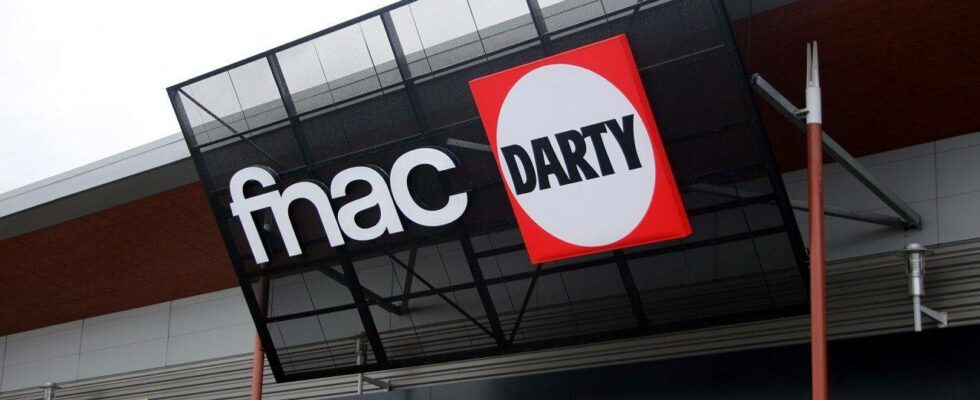(AOF) – “In a particularly difficult context for the distribution sector with increased pressure on household purchasing power which notably impacted this key end of the year for the Group”, Fnac Darty announces an estimate of its sales and results for the 2022 financial year. Free operating cash flow was negative at €30 million, impacted by a drop in sales in December and by the negative effects of the working capital requirement. Free cash flow from operations amounted to 170 million euros in 2021.
As a result, the cumulative free cash flow target of approximately €500 million extended to the period 2021-2024. This amount was previously planned for the 2021-2023 period. Fnac Darty has however maintained its ambition to generate free operating cash flow of at least 240 million euros on an annual basis from 2025.
Current operating income estimated at nearly 230 million euros, ie a current operating margin of around 2.9% compared to 271 million euros and 3.4% respectively.
In 2022, revenue would be around 7.945 billion euros and would post an estimated decline of 1.2% in published data and 1.9% on a like-for-like basis.
“This change is mainly linked to the decline in sales recorded in December for around -55 million euros, reflecting fewer volumes sold, in particular for the small household appliances and computer equipment categories which had particularly outperformed last year”, explains the distributor.
AOF – LEARN MORE
Key points
– First French distributor, born in 2016, of technical products and household appliances under the Fnac and Darty brands and second web distributor;
– Activity of €8 billion split between technical products (49%), editorial products (16%), household appliances (22%) and other products & services;
– Strong presence in France & Switzerland (83% of sales), the Iberian Peninsula (9%) and Belgium & Luxembourg and first steps in Africa in Senegal;
– Responsible digital distributor business model;
– Open capital with the German Ceconomy as the 1st shareholder, followed by the insurer Indexia, Enrique Martinez being managing director and Jacques Veyrat chairing the board of 14 members;
– Financial position under control with €1.2 billion in cash and €1.6 billion in equity, compared to €1.1 billion in net debt
Challenges
– New Everyday strategic plan based on 3 pillars by 2025: digitization, via 50% of investments, in omnichannel distribution by placing sellers at the center of advice and targeting 30% of sales on the web / support for customers towards more sustainable products via the sustainability score (reliability, availability of spare parts, repair) / deployment of DartyMax, repair service by subscription (targeted 2M subscribers) / cumulative free self-financing of €500m over 2021-23 and €240m annually from 2025 ;
– Data-oriented innovation strategy and open innovation: improvement of knowledge and quality of data and partnership with Google on the use of data, network of partner venture capital funds and Digital Factory;
– Environmental strategy: halving of CO2 emissions in 2030 vs 2019 / circular economy with the extension of the life cycle of products (DartyMax repair subscription, “Darty sustainable choice” label, deployment of WeFix repair services in partnership with Apple) and resale of second-hand books in partnership with La Bourse aux livres / partnership with Valeco to increase the share of green energy and with the Raise Seed for Good seed fund integrating ESG criteria into its support;
– Customer loyalty with 10 million members, including 7 million in France;
– Expanded diversification after kitchen furniture at Darty and mobility, establishment of home spaces, games and toys in stores;
– Rise to 26% of sales in France from online purchases, coupled with the opening of 55 stores, bringing the total to 957.
Challenges
– Strong competitive risk from Amazon;
– Ability to maintain supply despite difficulties in supply chains;
– Spin-offs from partnerships with Google Cloud and, in Switzerland, with the Manor network;
– 2022 expectations confirmed after an increase in profitability in the 1st quarter: caution on market trends but acceleration of the Everyday plan by capitalizing on the omnichannel sector, cost control and continued subscriptions;
– Dividend of €2 for 2021.
Find out more about the specialized distribution sector
Concerns remain
According to the Federation of Specialized Trade, Procos, in October 2022, activity fell by 1.5% over one year. Nevertheless, the beauty and health (+ 5.2%) and specialized food (+ 3.5%) activity is dynamic compared to October 2021. The frequentation of the points of sale was very impacted by the problems of fuel and bad weather. Compared to October 2019, the pre-covid year, the drop in attendance is very sharp (-20.9% in October). Shopping centers and the outskirts are more impacted than city centers with a difference of four to five points.
Several reasons for concern exist for the future. The players are experiencing a very significant scissor effect given the increase in their operating costs while the evolution of demand is very uncertain. Very few brands can pass on the increase in their costs to their selling prices. The federation therefore asks, among other things, to limit the indexation of the Commercial Rent Index to + 3.5% for the rents of all companies in 2023. It also invokes an absolute urgency: to cap the price of energy for 2023 and retroact on the contracts already signed to prevent the rate of failures from accelerating.
